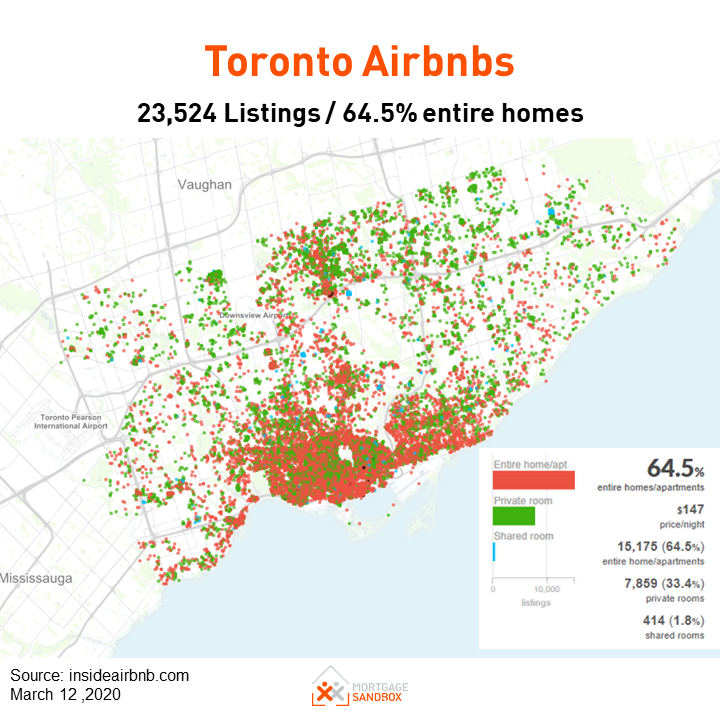Will Airbnb’s success destabilize Toronto home prices?
Coronavirus has led to cancelled conferences, travel bans, postponed sports leagues, and restrictions on small gatherings. Without a steady flow of travellers, short-term rentals will sit empty. Many Airbnbs will not be able to sustain a year without a high season.
International Travel Bans
Canada has closed borders to most non-citizens except for the United States, and that means no tourists or international business travellers. Toronto welcomes typically over 27.5 million visitors annually. 2.9 million of Toronto’s tourists come from the United States, 319,000 from China and 263,000 from the United Kingdom.
Although there is no travel ban with the U.S., many potential U.S. travellers will avoid coming to Canada in case the rules change suddenly, as they have for other countries. Canada may also close its borders with the U.S. to prevent healthcare tourism. Americans with no healthcare coverage seeking Coronavirus care in Canada’s public healthcare system.
Local Tourism Discouraged
Ontario has declared a state of emergency. Premier Doug Ford has prohibited organized events of 50+ people and order the closing of:
Facilities providing recreational programs.
Libraries.
Schools.
Licensed child care centres.
Bars and restaurants (takeout and delivery permitted).
Theatres, cinemas and concert venues.
Professional Hockey, Basketball, Soccer, and Football seasons are cancelled or postponed.
Canadian’s who, in a typical year, might have considered a weekend stay in Toronto, to enjoy a show or a game, don’t have the privilege of that choice anymore.
Airbnb Concerns
Toronto hosts nearly 24,500 Airbnbs and 65% of them rent out the entire home. Travel bans will effectively shut down short-term rentals for the next few months (Canada’s tourist high season). The drop in bookings may force many owners of apartments primarily used as short-term rentals to sell their condo or repurpose it for long-term rentals adding up to 15,000 homes to the market in the next six months.
Can they sustain three to six months without any bookings? They might be forced to sell their properties or turn their unit into a long-term rental. Either response will add housing supply to a weak real estate market and increase downward pressure on prices.
In 2019, Metro Toronto built 27,000 new homes so an additional 15,000 in housing stock would be unprecedented.
Our concern rests in the hypothesis that tight supply raises rents and encourages speculators to invest in properties short-term rental properties, and this further reduces housing supply for working residents. That increases the upside volatility of home prices.
On the flip-side, weak markets lead to higher short-term rental vacancies, which make Airbnb’s unprofitable. The drop in short-term rental revenues creates an incentive for owners to sell their properties or convert them to long-term rentals. The sudden rush of housing supply for working residents may further depress home prices.
In this respect, short-term rentals like Airbnb and VRBO are different from hotels because hotels do not have the option of shifting the use of their rooms to other purposes.
Time will tell whether, from a city planning and housing stock management standpoint, short-term rentals are a beneficial use for residential real estate or do more harm than good.
Like this post? Like us on Facebook for the next one in your feed.


